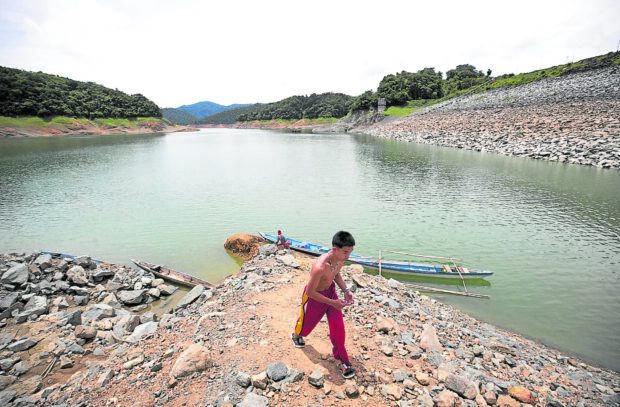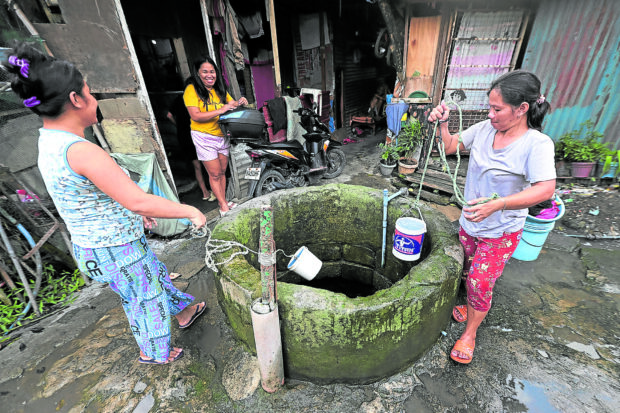Metro Manila households face daily water supply cut

STILL DROPPING | Residents living near Angat Dam at Barangay San Lorenzo Hilltop in Norzagaray, Bulacan, are witnesses to the rapid drop in the level of the reservoir that supplies water to Metro Manila. The water level at Angat on Monday, July 11, 2023, was 179.26 meters, down from 179.99 m on Saturday. (Photo by LYN RILLON / Philippine Daily Inquirer)
MANILA, Philippines — Starting Wednesday, more than half a million households within the concession area of water distributor Maynilad Water Services Inc. will have to endure service interruptions of as long as 11 hours as the water level of Angat Dam continues to drop amid the El Niño weather phenomenon.
On Monday, Maynilad water supply operations head Ronald Padua explained that around 591,000 customers in Caloocan, Navotas, Malabon, Valenzuela, Manila, and Quezon cities will have their supply cut from 7 p.m. to 4 a.m.
However, this will be extended to 6 a.m. in some areas in Caloocan, Malabon, and Quezon City due to their distance from Angat Dam.
“We have limited the implementation of the water service interruption to nighttime so that it won’t be much of an inconvenience to our customers,” Padua said, and assured the public that services would resume “on time.”
He could not give an estimate of how long the service interruptions would last, saying that this would largely depend on rainfall in the Ipo watershed.
Article continues after this advertisementThis comes after the elevation in Angat Dam on Monday morning further dipped to 179.26 meters from 179.99 m on Saturday, which is already below the 180-m minimum operating level at which water services are available 24/7.
Article continues after this advertisementAngat currently supplies 98 percent of potable water in Metro Manila through the Metropolitan Waterworks and Sewerage System (MWSS).
Water from Angat — estimated at 4,000 million liters per day (MLD), or equivalent to around 1,600 Olympic-sized swimming pools — flows to the La Mesa and Ipo dams to help deliver raw water to Maynilad’s and Manila Water Co. Inc.’s treatment plants.
Maynilad gets the majority of Angat’s allocation at 2,600 MLD given its bigger customer base at 9.5 million, compared with Manila Water’s 7.6 million.
Elevation at Ipo Dam also lowered to 98.59 m on Monday, already below its 101-m maintaining level.
Deep wells
The National Water Resources Board opted to cut supply allocation for the MWSS to 48 cubic meters per second (CMS) from 52 CMS to allow Metro Manila’s main water source to recover.
“Because of the lower allocation, we no longer have enough supply in the La Mesa portal … For us to address this gap, we need to lower the supply that we deliver to customers at certain times of the day,” Padua said.
Maynilad and Manila Water split supply coming from Angat in the La Mesa portal.
Padua said they expect around 62 MLD of additional supply coming from its water loss reduction efforts by the latter part of the year when El Niño is projected to be at its worst.
Padua added that they were also reactivating Maynilad’s deep wells from 60 locations as buffer supply, while other projects were expected to come on stream by the latter part of the year.
Asked why only the Maynilad concession area was affected by the lower allocation, Padua explained that cities in the west zone were closer to Manila Bay, which had poor water quality that could not be used to augment the dwindling supply.
He added that the company inherited old water networks that needed repairs and that they had already replaced 66 percent of these.
Padua remained optimistic, however, that rainfall would increase until next month to raise water levels, particularly in Ipo Dam, since this had a lower capacity and spilling level.
“Hopefully this happens in the Angat and Ipo watersheds to lessen the number of days that we need to execute the water service interruptions,” Padua added.

ALTERNATIVE SOURCE | This well supplies the water needs of a neighborhood at Barangay Old Capitol Site in Quezon City and will be useful during service interruptions from water concessionaires. (Photo by GRIG C. MONTEGRANDE / Philippine Daily Inquirer)
Metro Manila last experienced a water crisis in 2019, when millions of households had to suffer hours — sometimes days — without water, after the water level in Angat dipped below the 160-m critical level.
Gov’t plan
With the looming prospect of extended interruptions, President Ferdinand Marcos Jr. has ordered the Water Resources Management Office, an attached agency of the Department of Environment and Natural Resources, to submit this week its recommendations to ease the impact on the country of the El Niño phenomenon.
“I just spoke to [Environment Secretary Maria Antonia Yulo-Loyzaga] and she has told me that she will be prepared to make public what needs to be done,” the President said.
He said the departments of environment, public works, agriculture, and the National Irrigation Administration were already coordinating to address the looming water shortage in the coming months.
Marcos also said he had tapped former Public Works Secretary Rogelio Singson to help the government draw up a “contingency plan” to mitigate the effects of El Niño on the country’s water resources.
He said Singson, who headed the Department of Public Works and Highways during the administration of the late President Benigno Aquino III, would take part in “crafting an overall plan for the Philippines.”
He described Singson, former president of Maynilad who is now the president and chief executive officer of Metro Pacific Water, a water investment firm of business tycoon Manuel V. Pangilinan, as a “water management expert.”
“We have a plan,” Marcos said during a meeting in Malacañang on the government’s response to the prolonged dry spell brought about by surging temperatures across the world.
Senate Minority Leader Aquilino Pimentel III on Monday said Marcos should thoroughly discuss his administration’s concrete long-term plans to address the recurring water shortage in his upcoming second State of the Nation Address.
Pimentel also appealed to the public to conserve water and electricity during this critical period, as he cited how adverse effects of water shortage and El Niño would lead to “far-reaching consequences” on various sectors of the economy.